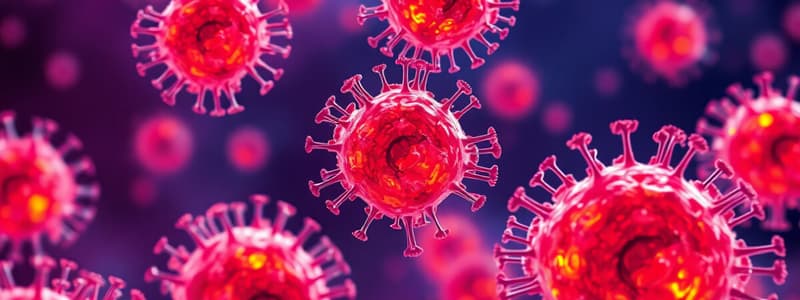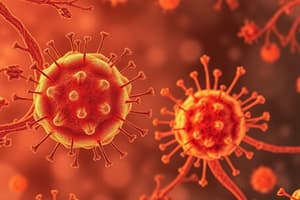Podcast
Questions and Answers
What are the two types of adaptive immunity?
What are the two types of adaptive immunity?
- Cellular (CMI)
- Humoral (HMI)
- Both A and B (correct)
- None of the above
Where do B lymphocytes mature?
Where do B lymphocytes mature?
Bone marrow
What do helper T cells do?
What do helper T cells do?
Coordinate immune responses
Cytotoxic T cells do not need to recognize a specific antigen to attack cells.
Cytotoxic T cells do not need to recognize a specific antigen to attack cells.
What type of cells do natural killer cells attack?
What type of cells do natural killer cells attack?
Antibodies are primarily found in the ______ globulin band.
Antibodies are primarily found in the ______ globulin band.
What are the five major classes of antibodies?
What are the five major classes of antibodies?
What are cytotoxins?
What are cytotoxins?
Match the following types of immunity with their descriptions:
Match the following types of immunity with their descriptions:
Flashcards are hidden until you start studying
Study Notes
Acquired or Adaptive Immunity
- Resistance based on specific responses to eliminate a foreign substance
- It can be cellular (CMI) or humoral (HMI)
- Includes T cells, B cells, antibodies, and cytokines
- T cells mature in the thymus and provide help to B cells and other phagocytic cells
- B cells mature in the bone marrow and differentiate into plasma cells that produce antibodies
- Antibodies are responsible for killing virally infected target cells
Characteristics of Adaptive Immunity
- Specificity for each individual pathogen or microbial agent
- Ability to remember a prior exposure
- Increased response to a pathogen upon repeated exposure
Types of T Cells
- Helper T cells coordinate immune responses by communicating with other cells
- Killer T cells are cytotoxic killer cells and natural killer cells
Killer Cells
- Two types: cytotoxic T cells and natural killer cells
- Cytotoxic T cells recognize a specific antigen on a foreign invader
- Natural killer cells do not need to recognize a specific antigen
- Both types contain granules filled with potent chemicals and kill on contact
- Killer cells bind to the target, aim weapons, and deliver lethal chemicals
Cytotoxic T Cells
- Help rid the body of cells infected by viruses and cells transformed by cancer
- Recognize a specific antigen on the foreign cell
- Responsible for rejection of tissue and organ grafts
Natural Killer NK Cells
- Armed with granules containing lethal doses of chemical
- Attack cells lacking the self MHC molecule
Cytotoxins
- Polypeptides that cause cell injury, inflammation, intestinal secretion through inhibition of protein synthesis
Modes of Acquiring Immunity
- Immunity is acquired through Natural and Artificial mechanisms - passive or active
Passive Immunity
- Natural passive immunity is provided through placental transfer of IgG and colostral transfer of IgA
- Artificial passive immunity is provided through antibodies or immunoglobulins and immune cells
Antibodies
- Immunoglobulins
- Glycoproteins found in serum containing 82% to 96% polypeptide and 2% to 14% carbohydrate
- Five major classes: IgG, IgM, IgA, IgD, IgE
- The key element of the humoral immune response
- Appear primarily in the gamma (γ) globulin band with serum electrophoresis at pH 8.6
Tetrapeptide Structure of Immunoglobulins
- Contains four-chain polypeptide
- Two large polypeptide chains are heavy (H) chains
- Two small polypeptide chains are light (L) chains
Studying That Suits You
Use AI to generate personalized quizzes and flashcards to suit your learning preferences.




